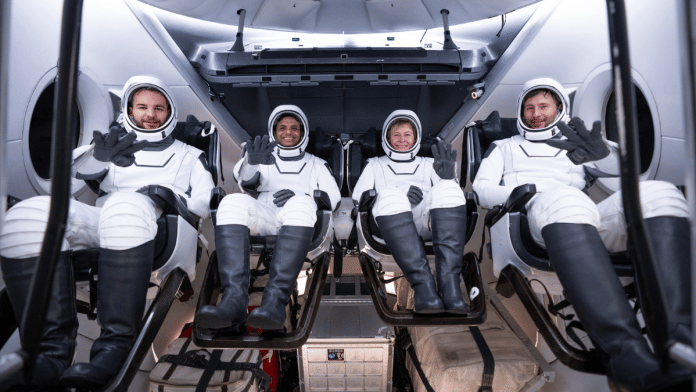As Indian Air Force Group Captain Shubhanshu Shukla successfully begins his journey to the International Space Station (ISS), it is important not to view the Axiom-4 mission as a one-off event. Four agencies are involved in this mission.
Axiom Space, a US-based space infrastructure company founded in 2016, partnered with Elon Musk’s SpaceX to launch commercial astronauts to the ISS. SpaceX launched the mission using its Falcon 9 rocket. The Indian Space Research Organisation (ISRO) is part of the Axiom-4 mission through its collaboration with NASA.
Modern-day joint collaborations between nations and space agencies differ significantly from those in the past. Today, there is a strong economic dimension to such partnerships. Four decades ago, the Soviet Union under Leonid Brezhnev offered India an opportunity to send a cosmonaut into space. Wing Commander Rakesh Sharma’s 1984 journey aboard Soyuz T-11 could be seen as a goodwill gesture. In contrast, for the Axiom-4 mission, India is known to have paid around Rs 550–600 crore.
For India, this mission is important for developing its future space programmes. The insights gained will benefit the Gaganyaan human spaceflight mission, as well as future missions such as India’s space station and possible crewed missions to the Moon.
Shukla will gain a lot of experience in space travel by working on a space station, experience that will prove useful for India’s upcoming missions. He is piloting the Axiom-4 mission to the ISS and is expected to conduct seven specialised experiments during his stay. These experiments have been jointly designed and developed by ISRO and the Department of Biotechnology. This marks the first time ISRO is conducting research under microgravity conditions.
Astronaut Shukla will also carry out exclusive experiments related to food and nutrition. The goal is to pioneer space nutrition and develop self-sustaining life-support systems, which would be vital for long-duration missions. A major focus is on India-centric food, including experiments on sprouting *methi* (fenugreek) and *moong* (green gram) in microgravity. There is a proposal to expose seeds to space’s microbiotic conditions and return them to Earth for further analysis.
Along with the other astronauts, Shukla will also be involved in diabetes monitoring. Other key experiments include studying muscle degeneration and myogenesis in microgravity (which is crucial for astronaut health on long missions) as well as the cognitive effects of screens (“Screens in Space”) on human vision and performance.
ISRO has already successfully conducted a space docking experiment and plans another mission involving docking in an elliptical orbit. Apart from India’s upcoming Moon mission, expertise in space docking is going to be extremely important for building and operating India’s own space station. Shukla is expected to gain hands-on knowledge of various aspects of docking through this mission. The experience of conducting experiments in microgravity will also help in designing future experiments aboard India’s space station.
An Indian astronaut spending around 14 days aboard the ISS offers invaluable real-world experience in spacecraft operations, including crew health management, emergency procedures, docking manoeuvres, and daily life in space.
Beyond the scientific gains, Group Captain Shubhanshu Shukla’s mission to the ISS reinforces India’s global standing in space exploration. It also sparks curiosity and inspiration among the next generation of scientists, engineers, and future space travellers.
Ajay Lele is a Senior Fellow at the Manohar Parrikar Institute for Defence Studies and Analyses. Views are personal.
(Edited by Prashant)







Indian space program is all about Brahmins. A non-Brahmin has absolutely no place in the existing scheme of things.